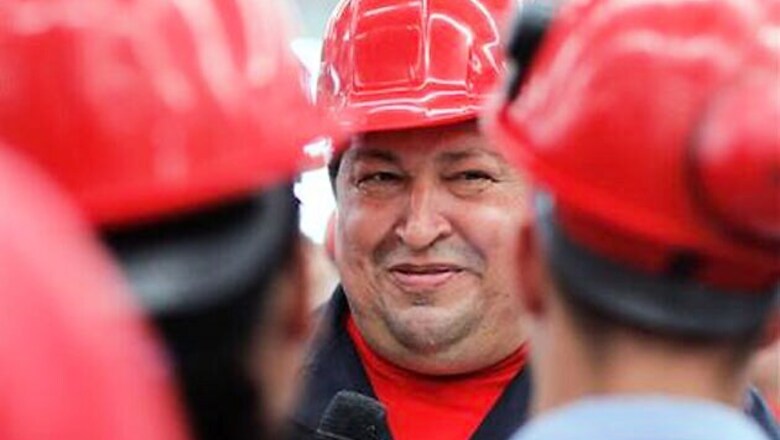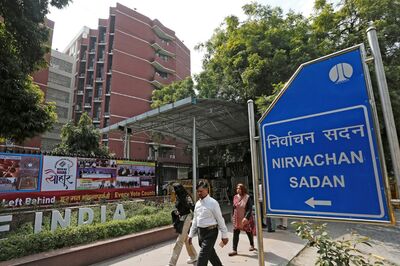
views
Caracas: President Hugo Chavez has raised serious doubts about whether he'll have the stamina for a successful re-election bid, revealing that he needs to return to Cuba to have a lesion removed that is probably malignant.
Chavez told Venezuelans on Tuesday that doctors in Cuba had over the weekend found a two-centimeter (less than an inch) lesion in the same place where they removed a cancerous tumor last year.
The socialist president, who hopes to extend his 13 years in power with another six-year term in the Oct. 7 elections, said the probability is high that the lesion is malignant and that he will likely need radiation therapy.
That will most likely mean being incapacitated in the coming weeks, though Chavez did not mention who might replace him during a temporary absence.
"I'm not going to be able to continue with the same rhythm," he told state TV in a telephone call on Tuesday night, adding he would need to "rethink my personal agenda and take care of myself, confront what must be confronted."
Chavez, 57, did not say when he would depart for Cuba. He said he would attend to government business on Wednesday, including signing papers and meeting with the Cabinet and military leaders.
His departure for Havana will be made "without haste," he said. "All in good time."
A leading Colombian oncologist, Dr. Carlos Castro, said that if Chavez undergoes radiation therapy that typically means a minimum of 10 daily sessions, which means Chavez would need to name a temporary replacement while undergoing treatment.
The news is bad for Chavez's political longevity, said Luis Vicente Leon, director of surveying at the Datanalisis polling firm. Even if the 57-year-old president returns to form after surgery, it will "be difficult to avoid comparisons to his rival (Henrique) Capriles," an energetic and athletic 39-year-old former governor, the pollster said.
From July to September last year, Chavez received four rounds of chemotherapy, both in Cuba and in Venezuela, and he subsequently said tests showed he was cancer-free.
Chavez on Tuesday denied rumors that the cancer had spread aggressively even as he said doctors do not know whether the new growth was malignant.
"I completely deny what's going around that I have metastasis in the liver or I don't know where, that the cancer has spread all over my body and that I'm already dying," he said.
He has never given the cancer's exact nature or location, and opposition politicians and critics have repeatedly accused Chavez of a lack of transparency.
Analyst Cynthia Arnson of the Woodrow Wilson International Center in Washington said the new surgery seriously complicates Chavez's re-election prospects.
"It's now clear that Chavez's cancer is far from cured. Chavez's illness - his ability to campaign as well as to govern - is a major factor in the race. It erodes the aura of invincibility as well as inevitability that Chavez has always tried to create," she said.
The governing party will also be vexed as it lacks an alternative candidate with Chavez's charisma and popular following, Arnson said. She predicted the development will make "a tight race even tighter" against Capriles.
"I am in good physical shape to confront this new battle," Chavez said on Tuesday afternoon.
He later choked up, reflecting on mortality in the phone call.
"I ask for life," he said. "I want to live with you and fight with you until the last moment of this life that God gave me."
He called on his backers to "accelerate the (electoral) battle."
Chavez, whose approval ratings have topped 50 percent in recent polls, had been out of public sight since Friday.
In recent weeks, he has recovered the hair he shaved off during chemotherapy and he has appeared vigorous, although he is puffy around the face and neck. He had returned to a full schedule of activities including marathon television appearances.
Doctors consulted said it was difficult to assess Chavez's prognosis. But Dr. Javier Cebrian, a colorectal specialist and chief surgeon at University Hospital in Caracas, said the lesion being in the very place the initial tumor was removed was not good.
"A local recurrence is a bad symptom because it means the illness is growing again," he said.
"It's an ominous sign," agreed Dr. Michael Pishvaian, a Georgetown University oncologist.
Pishvaian said doctors often use the term lesion to refer to a new tumor, which appears to fit Chavez's description.
He said such a reappearance, particularly when a patient has undergone surgery then chemotherapy, suggests cancerous cells have resisted the treatments.
Capriles' campaign coordinator, Armando Briquet, said he and his team wish Chavez "a complete recovery" and "a long life although we have always been critical about the lack of real information about the president's health."
Many Venezuelans have been impressed by Chavez's fortitude.
"It's already established that Chavez is a superman because he was sick and he didn't delegate to anyone," said Luis Montilla, a 51-year-old lawyer, expecting Chavez to return to Cuba for surgery and still not delegate.
"He will continue his treatments and continue the campaign," Montilla predicted as he waited in line at a Caracas pharmacy.




















Comments
0 comment